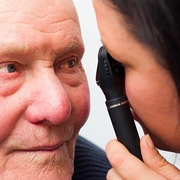Information you need to live a happy, worry-free retirement!
Originally published May 23, 2018, last updated May 23, 2018
3 Tips to Counteract Cataracts

As you age, you’re at greater risk of developing a cataract, a leading cause of vision loss and blindness among older adults in the United States. More than half of all Americans have cataracts by the time they are 80 years old, according to Prevent Blindness, a volunteer eye health and safety organization dedicated to fighting blindness and saving sight.
The organization has declared June as Cataract Awareness Month to educate the public on the medical condition, a clouding of the lens in the eye. Many factors can contribute to the development of cataracts, including certain diseases, long-term steroid use, medications and family history. But most cataracts are related to aging, when some of the protein that makes up the clear lens start to clump together making it harder to see. Eyeglasses, brighter lighting and anti-glare sunglasses can improve cataract symptoms, but sometimes surgery is the most effective treatment. In the United States, cataract removal is the most common surgical procedure, according to the American Optometric Association.
The condition is not 100% preventable unfortunately. But you may be able to reduce your risk of developing cataracts or to slow their progression.
- Protect your eyes from the sun
Direct exposure to ultraviolet radiation can cause cataracts. Studies show that people who stay in the sun tend to get cataracts eight to 10 years before those who are mostly in the shade or indoors. Wear sunglasses and a hat with a brim to block the sun’s damaging rays. While most sunglasses protect from UVA, the most-damaging of the sun’s rays, look for sunglasses that also protect you from UVB. And make sure you wear your sunglasses in all seasons.
- Eat colorful fruits, veggies and whole grains
Research shows that while we don’t know the exact cause of cataracts, free radicals could be a cause. These unstable chemicals cause cell weakness or cell death when they come in contact with our cell membranes or DNA. To fight free radicals, eat foods rich in antioxidants, molecules that neutralize free radicals before cell damage can occur. Look for foods with vitamin E — sunflower seeds, almonds, spinach, dark leafy greens —beta-carotene, vitamin C and selenium. Lutein and zeaxanthin — the only carotenoids found in the eye — also are showing promise in the fight against cataracts. Kale is a powerhouse for these two nutrients. Check out this list of cataract-fighting foods from the American Optometric Association.
- Stop smoking
Smoking increases your risks for developing cataracts, age-related macular degeneration and uveitis. If you’ve been looking for more motivation to stop, quit smoking to lower your risk for cataracts.
Medicare and Cataracts
While Medicare does not cover eyeglasses or contact lenses, most cataract surgery is covered by Medicare and health insurance. Medicare Part B (medical insurance) helps pay for corrective lenses following cataract surgery that implants an intraocular lens.
Free Cataract Information
For more information on cataracts, call Prevent Blindness at 1-800-331-2020 or visit www.preventblindness.org/cataract.



